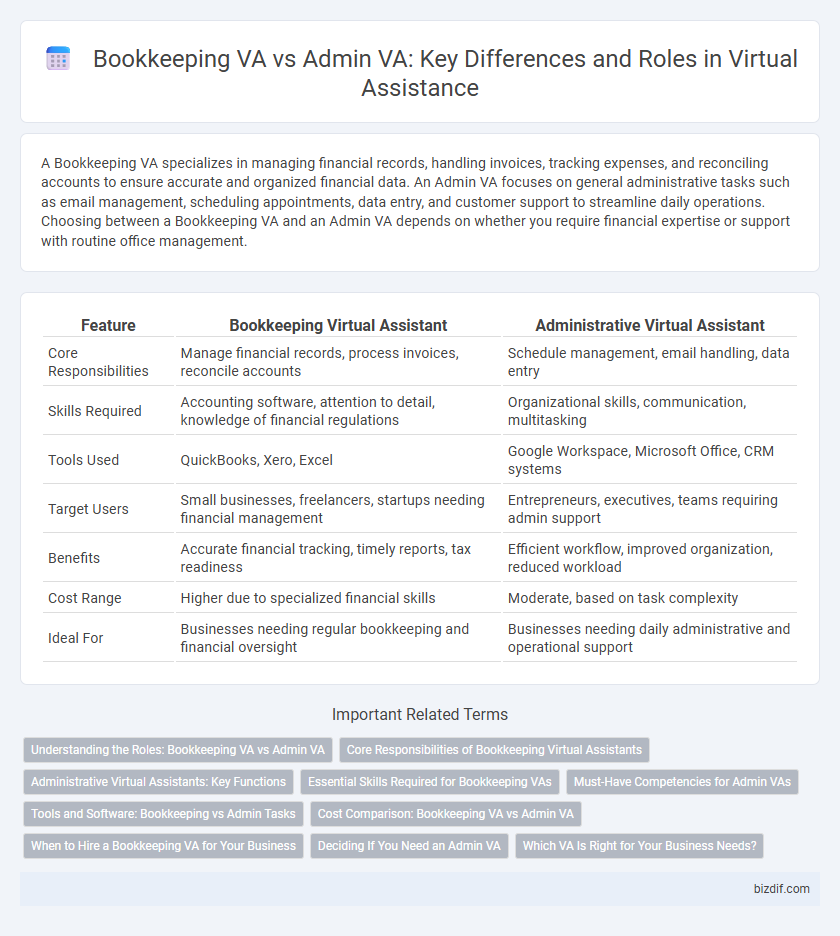A Bookkeeping VA specializes in managing financial records, handling invoices, tracking expenses, and reconciling accounts to ensure accurate and organized financial data. An Admin VA focuses on general administrative tasks such as email management, scheduling appointments, data entry, and customer support to streamline daily operations. Choosing between a Bookkeeping VA and an Admin VA depends on whether you require financial expertise or support with routine office management.
Table of Comparison
| Feature | Bookkeeping Virtual Assistant | Administrative Virtual Assistant |
|---|---|---|
| Core Responsibilities | Manage financial records, process invoices, reconcile accounts | Schedule management, email handling, data entry |
| Skills Required | Accounting software, attention to detail, knowledge of financial regulations | Organizational skills, communication, multitasking |
| Tools Used | QuickBooks, Xero, Excel | Google Workspace, Microsoft Office, CRM systems |
| Target Users | Small businesses, freelancers, startups needing financial management | Entrepreneurs, executives, teams requiring admin support |
| Benefits | Accurate financial tracking, timely reports, tax readiness | Efficient workflow, improved organization, reduced workload |
| Cost Range | Higher due to specialized financial skills | Moderate, based on task complexity |
| Ideal For | Businesses needing regular bookkeeping and financial oversight | Businesses needing daily administrative and operational support |
Understanding the Roles: Bookkeeping VA vs Admin VA
Bookkeeping VAs specialize in managing financial records, including invoicing, expense tracking, and payroll processing to ensure accurate accounting and compliance. Admin VAs handle broader organizational tasks such as email management, scheduling, customer support, and document preparation to streamline daily operations. Understanding these distinct roles helps businesses allocate resources effectively and optimize workflow efficiency.
Core Responsibilities of Bookkeeping Virtual Assistants
Bookkeeping virtual assistants specialize in managing financial records, processing invoices, reconciling bank statements, and tracking expenses to ensure accurate and up-to-date accounting data. Their core responsibilities include maintaining ledgers, preparing financial reports, and handling payroll tasks with precision. Unlike general admin VAs, bookkeeping VAs require expertise in accounting software like QuickBooks or Xero to support business financial operations effectively.
Administrative Virtual Assistants: Key Functions
Administrative Virtual Assistants specialize in managing day-to-day operational tasks such as email management, calendar scheduling, data entry, and customer support, enhancing organizational efficiency. They handle document preparation, travel arrangements, and communication coordination to streamline workflow for busy professionals. Unlike Bookkeeping VAs who focus on financial record-keeping and transaction management, Administrative VAs provide comprehensive support that keeps business operations running smoothly.
Essential Skills Required for Bookkeeping VAs
Bookkeeping VAs require proficiency in accounting software like QuickBooks and Xero, strong numerical accuracy, and the ability to manage financial records systematically. Expertise in data entry, reconciliations, and understanding of basic accounting principles ensures accurate transaction tracking and financial reporting. Attention to detail, confidentiality, and time management are critical skills distinguishing bookkeeping VAs from general admin assistants.
Must-Have Competencies for Admin VAs
Admin Virtual Assistants must excel in calendar management, email correspondence, and data entry to ensure smooth daily operations. Proficiency in project management tools like Asana or Trello and strong communication skills are essential for coordinating tasks and liaising with clients or team members. Mastery of document preparation, record keeping, and basic troubleshooting enhances an Admin VA's ability to support diverse administrative functions effectively.
Tools and Software: Bookkeeping vs Admin Tasks
Bookkeeping VAs primarily use accounting software such as QuickBooks, Xero, and FreshBooks to manage invoicing, expense tracking, and financial reporting, ensuring accurate financial records. Admin VAs rely on tools like Microsoft Office Suite, Google Workspace, and communication platforms such as Slack and Zoom to handle scheduling, correspondence, and project management tasks. Each role demands specialized software tailored to its core functions, optimizing efficiency and task accuracy.
Cost Comparison: Bookkeeping VA vs Admin VA
Bookkeeping virtual assistants typically charge higher hourly rates ranging from $20 to $40 due to specialized financial skills and certifications, whereas admin virtual assistants generally cost between $10 and $25 per hour. The increased expense of bookkeeping VAs is justified by their ability to handle complex accounting tasks, tax preparation, and financial reporting, which require accuracy and compliance knowledge. Businesses opting for admin VAs save on costs by delegating general clerical tasks like scheduling and correspondence but may need to hire bookkeeping assistance separately for finance-related work.
When to Hire a Bookkeeping VA for Your Business
Hire a Bookkeeping Virtual Assistant when your business requires accurate financial recordkeeping, expense tracking, and invoice management to maintain compliance and cash flow clarity. Businesses experiencing growth, complex transactions, or time-consuming financial tasks benefit from a Bookkeeping VA's expertise in accounting software like QuickBooks or Xero. For routine administrative tasks such as scheduling, email management, or customer service, an Admin VA is more suitable, but hiring a Bookkeeping VA ensures specialized financial oversight essential for informed decision-making.
Deciding If You Need an Admin VA
Deciding if you need an Admin VA depends on your business's organizational and operational needs, focusing on tasks like managing schedules, handling correspondence, and streamlining workflow. An Admin Virtual Assistant excels in communication, calendar management, and basic project coordination, freeing up time for strategic activities. Compared to a Bookkeeping VA, who specializes in financial record-keeping and data entry, an Admin VA is better suited for improving efficiency through administrative support.
Which VA Is Right for Your Business Needs?
Bookkeeping VAs specialize in managing financial records, invoicing, and expense tracking, making them ideal for businesses needing accurate financial data and compliance support. Admin VAs handle general administrative tasks like email management, scheduling, and customer support, suitable for companies seeking operational efficiency and organization. Choosing the right VA depends on whether your priority is precise financial management or streamlined administrative workflow.
Bookkeeping VA vs Admin VA Infographic

 bizdif.com
bizdif.com